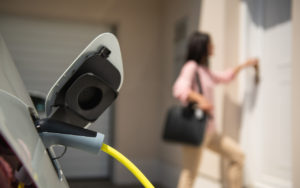The proposal to create an emission-free zone — which would be a first in Canada — is one of a number of electrification measures outlined in the city’s new climate plan

The proposal to create an emission-free zone — which would be a first in Canada — is one of a number of electrification measures outlined in the city’s new climate plan
Gasoline-powered vehicles could soon be blocked from entering “a significant part” of Montreal’s downtown core, according to Mayor Valérie Plante. “It won’t be [just one] street,” she added, pointing to other major urban centres like Paris that have put similar bans in place.
The proposed measure is one of 46 in the city’s 122-page Climate Plan released on December 10 (English summary and full plan in French). It’s a roadmap to help Montreal reduce its greenhouse gas emissions by 55 per cent between now and 2030 (versus 1990 levels), with a goal to be carbon neutral by 2050.
With transportation accounting for 30 per cent of Montreal’s total greenhouse gas emissions, the electrification of the sector is a major focus of the plan. By 2030, 47 per cent of vehicles registered in the city will be electric, the report promises — up from the current 2 per cent.
Aligns with province
This objective dovetails with the province’s recently announced goal of having 1.5 million electric vehicles in circulation province-wide by 2030, as stated in its own “Plan for a Green Economy,” published in November.
To grow zero-emission vehicles’ presence in the city, the Plante administration plans to expand charging infrastructure both on public and private lands. It will also switch to an all-electric municipal fleet and support the Société de transport de Montréal, the city’s transit authority, in its mission to go all-electric by 2040.
Finally, it will offer financial incentives to businesses like logistics firms that opt for zero-emission deliveries, similar to how it worked with these companies during a recent pilot project, Plante said.
Taxi industry a pacesetter
The Montreal plan, which is set to come into effect five years before the province of Quebec bans the sale of new gas-powered cars, could help boost the local taxi industry, which has seen quite a bit of action on the zero-emission front lately.
After declaring bankruptcy in 2019, app-based electric vehicle taxi service TéoTaxi was recently reborn under new ownership. Taxelco, Téo’s parent, also owns two conventional cab companies and aims to be fully electric by 2030.
As well, at the end of last year, rival startup E-Taxi set up shop in Montreal. The importer of the Chinese BYD e6 plans to bring 2,000 of the plug-in models over in the next few years, helping to finance drivers who want to make the switch.
Consultations next
If Montreal’s proposed ICE-vehicle ban survives planned public consultations with residents and businesses, it will be the first in Canada.
In 2019, Vancouver’s municipal government put out a report calling for zero-emission vehicle zones to be set up in the city, but they were not included in the Climate Emergency Action Plan council passed in November. Instead, Vancouver is proposing to charge drivers a fee to bring their cars, including electric vehicles, into the metro area.






